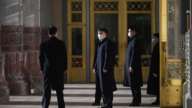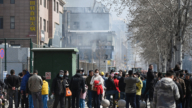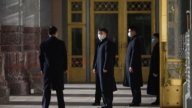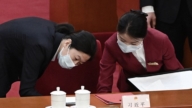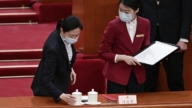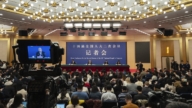【新唐人2013年03月11日讯】一直备受各界关注的大陆国务院“大部制改革”方案终于出炉。新一轮大部制改革由即将接任总理的李克强主导,政治局委员汪洋操刀。整合后,铁道部、国家新闻出版总署等部委将被撤并,国务院正部级机构将减少4个。
10号上午,中共十二届全国人大一次会议举行第三次全体会议,大陆国务委员兼国务院秘书长马凯,对“国务院机构改革和职能转变方案”进行说明。
根据这一方案,国务院将不再保留铁道部、卫生部、国家计生委、国务院食品安全委员会办公室、广电总局、国家新闻出版总署、国家电力监管委员会等7个正部级机构。而重新组建国家卫生和计划生育委员会、国家食品药品监督管理总局、和国家新闻出版广播电影电视总局3个正部级机构。
据了解,这次的大部制改革由即将接任总理的李克强主持大局,而可能出任副总理的汪洋则负责具体实施。整合后,国务院将减少4个正部级机构,一些职能相同或相近的部门被撤并。
对此,时政评论家蓝述向《新唐人》分析了大部制改革的背景。他指出,当前中共面临的经济形势非常严峻,GDP增幅在下降,政府财政预算也遇到越来越大的危机。
时政评论家蓝述:“所以说它要做一些必要的调整,减少一些政府部门养的不必要的机构和官员。这样的话,(可以)减少社会矛盾。”
蓝述也指出,中共所做的机构调整是“治标不治本”,并不能化解中国大陆的危机。
蓝述:“中共也看到了所面对的危机,它也想做一些事情。但是问题的核心、问题的根本他们不去动。那就是——中共的问题。因为中国社会的一切核心问题就是中共。”
大陆铁道部被称为“独立王国”,由中共前党魁江泽民,及前中央政法委书记周永康等把持,贪腐严重,负债高达2点6万亿人民币。前铁道部部长刘志军、副总工程师张曙光等人,先后因贪腐落马。
这次调整,铁道部的行政部门将改组为国家铁路总局,并入大交通部,负责铁路的建设规划。铁道部的运营部分则将变身为中国铁路集团总公司,划归国资委,以企业模式运营。
原大陆史学教授 刘因全:“原来那样呢,它的行政部门和企业合在一起,弊端很多。原来那个铁道部长刘志军贪污腐败那么严重,也与铁道部的这个体制政企不分有关系的。”
铁道部被分拆后留下的巨额负债如何处理﹖根据现任铁道部长盛光祖的解释,国家财政将负担铁道部的公益性债务,这也就是说,纳税人将为铁道部的贪腐恶果买单。
此外,中国大陆越演越烈的毒奶粉、地沟油等食品安全事故,也迫使当局不得不把“国家食品药品监管局”从卫生部门剥离出来,与国务院食品安全委员会办公室合并,成立正部级的“国家食品药品监督管理总局”。
多年来被广为批评的“计生委”也将并入卫生部,组建“卫生与人口计划生育部”。另外,国家电力监管委员会将被并入国家能源局,广电总局与新闻出版总署,合二为一。
北京《国情内参》首席研究员巩胜利:“其实中国大部制改革搞了10几年了。但现在一直都没有到位。比如这一次可能一些比较大的部,还没有到位。可能接下去,还要来(整合)。”
北京《国情内参》期刊的首席研究员巩胜利还指出,仅以农村城镇化举例分析,其中至少涉及进城农民的身份管理问题,和土地流转问题。也就是说,这背后相关的农业部和国土资源部等部门的改革,还远远没有到位。
采访/刘惠 编辑/李谦 后制/萧宇
China State Council Reorganizes. Ministry of Railways Dismantled
The Chinese State Council recently proposed institutional
reform and the transformation of government functions.
This will be conducted by the incoming Prime Minister,
Li Keqiang, and operated by Politburo member, Wang Yang.
According to the proposal, the Ministry of Railways will be
dismantled, with press and broadcasting regulators merged.
A total of four organizations under the State
Council will be either dismantled or merged.
In the morning of the 10 March, State Councilor Ma Kai
announced the Chinese State Council institutional reform
and transformation of government functions proposal,
to the annual session of the National People’s Congress.
Seven agencies will be affected.
These include; the Ministry of Railways; Health Ministry;
National Population and Family Planning Commission;
State Administration of Food and Drugs; the
General Administration of Press and Publications;
the State Administration of Radio, Film and
Television; and National Energy Administration.
The Council will establish a new National
Health and Family Planning Commission.
It will elevate the food and drug
agency to general administration.
It will set up one organ to oversee the press,
publications, radio, film and television sectors.
The incoming Prime Minister Li Keqiang
is expected to lead the State Council.
Deputy Prime Minister Wang Yang will operate
the restructuring and merging of departments.
Political commentator Lan Su spoke to NTD Television.
The proposal is in reaction to the difficult economy,
the declining GDP, and the budget crisis.
Lan Su: “These are adjustments to cut unnecessary
agencies and staff, and to reduce social conflicts.”
Lan Su, however, did not believe this
restructuring would relieve the crisis in China.
This is because it did not reach the core of the problem.
Lan Su: “The Communist regime saw the crisis,
but would not touch the core of the problem.
The Communist Party itself is the core issue for China.”
The Ministry of Railways is a so-called “independent
kingdom", dominated by former leader Jiang Zemin.
It is also dominated by the former secretary of the
Central Politics and Law Committee, Zhou Yongkang.
The corruption of the whole organization was
so severe that it carries a debt of 2.6 trillion yuan.
The former Minister of Railways Liu Zhijun,
and deputy chief engineer Zhang Shuguang, were respectively sacked due to corruption.
According to the proposal, the Ministry of Railways
will function under the Ministry of Transport.
This will allow it to fulfill its administrative functions
in technological standards and supervising.
The China Railway Corporation
will handle commercial functions.
Liu Yinquan, Historian: “The original Ministry of
Railways suffered the disadvantage of overseeing
both administration and commercial functions.
The corruption scandal of former Minister of Railways
Liu Zhijun is related to this doubling of responsibilities.”
How will the huge liabilities left behind
from the Ministry of Railways be handled?
According to the incumbent Minister of Railways
Sheng Guangzu, state finance will pay for
the welfare check from the Railway Ministry.
That means taxpayers pay for
the consequences of corruption.
The food safety issues in China are getting worse,
with the incidents of toxic infant formula and gutter oil.
They have pushed the ministry-level
General Administration of Food and Drugs.
They have merged the State Food and Drug
Administration under the Ministry of Health
and State Council’s Food Safety Office.
A national health and family planning
commission will be established.
They will merge the existing Health Ministry
with the widely criticized National Population
and Family Planning Commission.
State Electricity Regulatory Commission will be dissolved
and a new National Energy Administration will be set up.
Two press and broadcasting regulators will be merged.
Gong Shengli, Veteran Journalist: “Reorganization
of the regime has been done for the past 10 years.
It never quite gets to the point.
This time it was done on a larger scale, but still didn’t
get to the point. This type of reform will continue.”
Gong Shengli took rural urbanization as an example. There
are issues of the migrants identities and of land transfer.
That means reform of Ministry of Agriculture
and the Ministry of Land and Resources are necessary but this has not happened.


